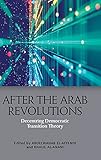After the Arab Revolutions : Decentring Democratic Transition Theory / Abdelwahab El-Affendi, Khalil Al Anani.
Material type: TextPublisher: Edinburgh : Edinburgh University Press, [2022]Copyright date: ©2021Description: 1 online resource (312 p.) : 8 B/W tablesContent type:
TextPublisher: Edinburgh : Edinburgh University Press, [2022]Copyright date: ©2021Description: 1 online resource (312 p.) : 8 B/W tablesContent type: - 9781474483216
- 9781474483230
- 320.9174927 23
- online - DeGruyter
| Item type | Current library | Call number | URL | Status | Notes | Barcode | |
|---|---|---|---|---|---|---|---|
 eBook
eBook
|
Biblioteca "Angelicum" Pont. Univ. S.Tommaso d'Aquino Nuvola online | online - DeGruyter (Browse shelf(Opens below)) | Online access | Not for loan (Accesso limitato) | Accesso per gli utenti autorizzati / Access for authorized users | (dgr)9781474483230 |
Frontmatter -- CONTENTS -- List of Figures and Tables -- Preface -- Notes on Contributors -- 1. Introduction: Rethinking Transition Theory after the ‘Arab Moment’ -- 2. Democratic Transition Studies: Lessons from Another Region -- 3. The Moderation of Insecurity: Standing the Eurocentric Democratic Transition Paradigm on its Head -- 4. After the Arab Spring -- 5. Revolutions and the Colonial Question -- 6. Authoritarian Regime Types as an Alternative to the Transition Paradigm: A Critical Assessment -- 7. Visible and Invisible Political Actors and their Strategies during the Arab Spring Transitions -- 8. Elite Women and Democratisation in Morocco, 1998–2016 -- 9. Rethinking Religion and Democratic Transition: Lessons from the Arab World -- 10. Democratic Transition in Rivalry Contexts -- 11. The ‘Arab Spring’ and the Challenges of Security Sector Reform -- Concluding Remarks: On Viruses, Phantom Actors and Other Colonial Ghosts -- Index
restricted access online access with authorization star
http://purl.org/coar/access_right/c_16ec
Incorporates the lessons learned from the 2011 Arab revolutions into democratic transition theoryRadically reclaims and reformulates democratic transition theory, taking the Middle East and not the West as its focal point Argues that recent Arab transitions are central to our understanding of the dynamics of democratisation, even in advanced democraciesFeatures contributions from prominent authors and intellectuals such as Azmi Bishara, Hamid Dabashi and Asef BayatAfter the Arab Revolutions brings together experienced scholars from the region and beyond to cast new light on the challenges facing democratic transitions and democratic stability. Rather than taking refuge in ‘context’ and ‘regional specificity’ to excuse failures to unpack Arab politics, the book argues that sound political science should – and could – prove relevant across regions and cultures.This radical critique reclaims and recasts the ‘Transition Paradigm’, countering the habit of using advanced and successful democratic transitions as a template to be followed in other regions. It argues that the Arab (and broader Middle Eastern) experience has important lessons to offer, even in its failures. For example, it could help to explain the West's recent populist upsurge and other democratic reversals.
Mode of access: Internet via World Wide Web.
In English.
Description based on online resource; title from PDF title page (publisher's Web site, viewed 29. Mai 2023)


